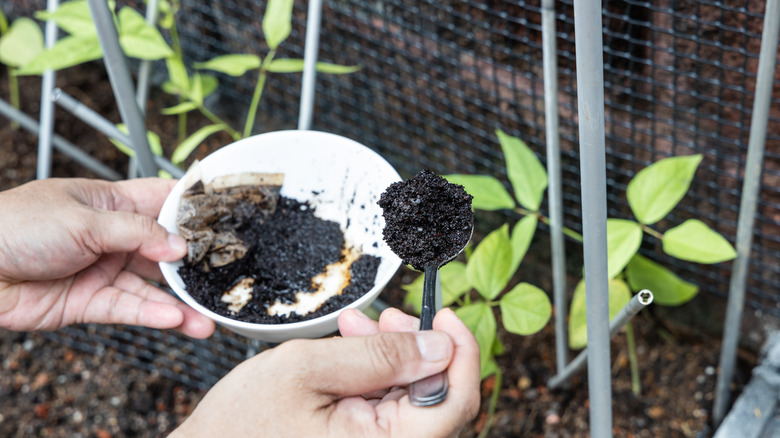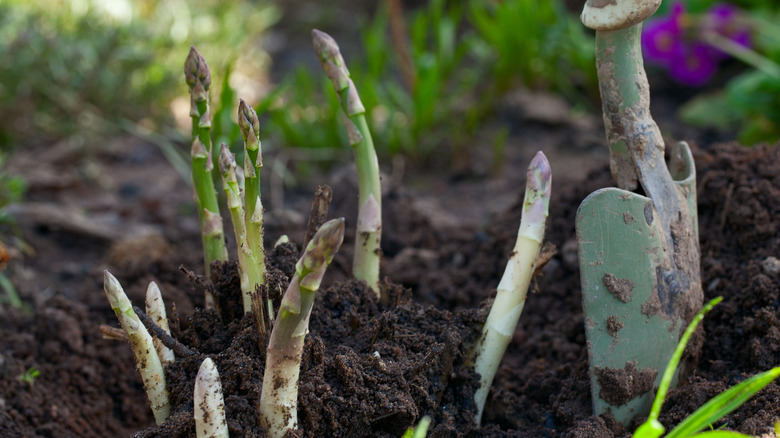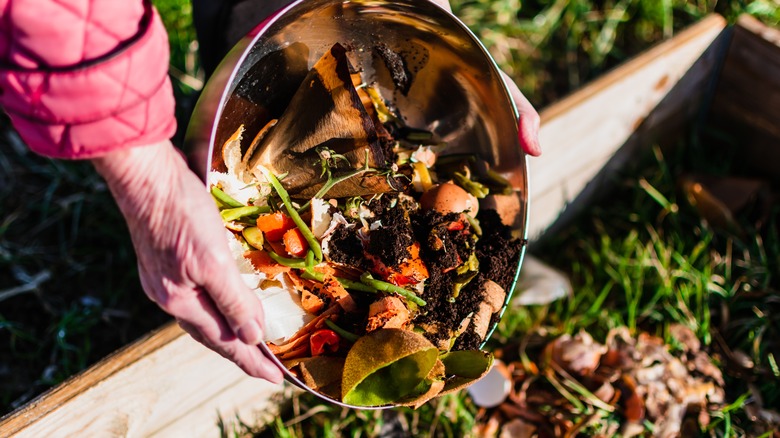Plants In Your Home And Garden That Don't Like Coffee Grounds As Fertilizer
Coffee grounds serve many purposes in the home and garden. Countless genius coffee grounds hacks can deter squirrels and deer, address household pests, keep your home and belongings smelling clean, and boost the health of some plants. Because they contain nitrogen, potassium, and phosphorus and they break down over a long period of time, coffee grounds make a great slow-release fertilizer for some garden staples like tomatoes. However, it's important to note that coffee grounds are not a catch-all solution for plant woes. Flora that thrives in alkaline soil or that is sensitive to caffeine won't appreciate fresh coffee grounds as direct fertilizer.
Creating the correct soil pH for your plants can be a balancing act. A simple soil test can tell you about your soil's current acidity and alkalinity. From most acidic to most alkaline, the pH scale goes from 0 to 14, with 7 being neutral. Some plants prefer slightly acidic soil, like tomatoes, which thrive in soil with pH levels between 6.2 and 6.8. These plants love a sprinkling of coffee grounds as fertilizer or mulch. Plants that prefer a more alkaline soil pH could react negatively to fresh coffee grounds as fertilizer.
Plants that dislike coffee grounds as fertilizer
Plants in your home and garden that don't like coffee grounds as fertilizer are those that are sensitive to acidity or caffeine. In the vegetable garden, asparagus is the most sensitive to acidic soil and prefers a fairly neutral pH level of 6.5 to 7.0. Various common herbs also prefer more alkaline to neutral soil, including lavender with a preferred pH of 6.5 to 8 and thyme with a preferred pH of 6 to 8.
Fresh coffee grounds can also have a negative effect on several common flowers and trees. Lilacs and roses like pH levels between 6 and 7, linden trees like pH between 7 and 7.5, and arborvitae trees prefer pH between 6 and 8. Other plants that won't appreciate your coffee grounds are those that are sensitive to caffeine, including roses, lilies, and hydrangeas. The final concern with using coffee grounds as an organic fertilizer for your garden soil is that it will cause fungal growth. It's important to use only a thin layer as mulch or fertilizer regardless of the plant, but as long as you use coffee grounds in moderation, they'll actually help prevent the growth of some harmful fungus types.
Things to keep in mind
The craze around coffee grounds in the garden has led to many instances of overuse. While it's definitely not a good idea to dump fresh coffee grounds onto plants that prefer alkaline soil, there's no need to panic if you've been using spent coffee grounds in moderation as a fertilizer. Coffee grounds can range in acidity levels, with some experiments out of the University of Arizona finding pH levels as low as 4.6 and as high as 8.4 in decomposing coffee grounds.
With all that said, fresh coffee grounds are an expensive option as fertilizer anyway. Spent coffee grounds are a much more common option, and they usually have a pH of 6.5 to 6.8, which is very close to neutral and is unlikely to alter the acidity of your soil if you use the grounds in moderation. Even if you grow alkaline-loving plants, it's okay to incorporate some used grounds in your compost.
If you do perform soil testing and find that the soil surrounding your azaleas or herbs is far too acidic, perhaps from past overuse of fresh coffee grounds, there are affordable ways to amend the soil and bring it back to an ideal pH. Incorporating the wood ash from a fireplace or stove can raise soil pH. You can also use agricultural lime from your local hardware store such as Soil Doctor Garden Lime for around $10 from Ace Hardware.


